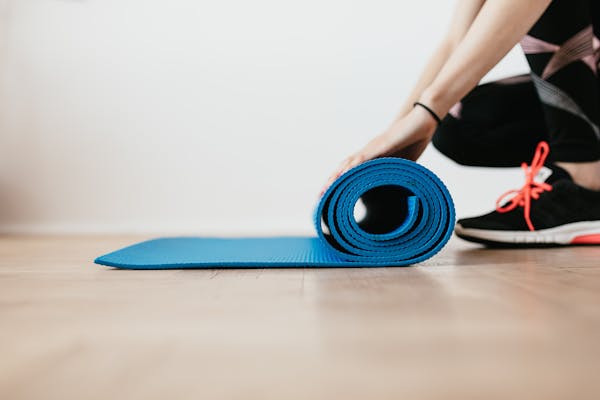Definition of Pilates
Pilates, also known as Contrology, is a type of exercise that aims to strengthen the body overall, improve physical fitness, and enhance flexibility and balance. It focuses on exercising individual muscles to increase the strength of the spine and the joints that support the skeletal structure of the human body. This type of exercise emphasizes the coordination and good communication between the body and mind, requiring awareness of how the body moves and breathes.
 |
| Core Strength Rediscovered: Pilates Journey to Fitness |
Origins of Pilates
Pilates was named after its German founder, Joseph Pilates, who believed in a strong connection between mental and physical health. Drawing inspiration from various Western sports such as gymnastics, boxing, and wrestling, Joseph Pilates developed these exercises. After immigrating to the United States in the 1920s, he opened a studio to teach his new method, initially named Contrology.
Practicing Pilates
Pilates can be practiced by people of all ages and fitness levels. However, it is recommended to seek advice from a healthcare professional before starting, especially for individuals with medical conditions. People with unstable blood pressure, osteoporosis, or risk of blood clots may be advised against practicing Pilates. It is also advisable to start with a certified instructor to ensure correct practice.
Gyms often have specialized Pilates equipment, including machines with straps and springs that provide resistance during workouts. Pilates can also be practiced at home using digital tutorials and specific equipment like mats. Although Pilates exercises might seem simple, they require precision and control. A typical Pilates session lasts between 45 minutes to an hour, usually done several times a week.
Difference Between Pilates and Yoga
Both Pilates and yoga involve exercises that focus on increasing body strength, balance, and flexibility, and improving breathing techniques. However, they differ in execution and characteristics. Yoga emphasizes meditation and relaxation, while Pilates focuses on physical strength. Yoga generally does not require equipment, whereas Pilates often involves mats and specialized machines. Additionally, Pilates movements follow a specific sequence, whereas yoga involves holding various poses.
Benefits of Pilates
Practicing Pilates offers numerous health benefits, including:
- Encouraging good posture and body alignment.
- Strengthening and sculpting muscles.
- Increasing body flexibility and improving balance.
- Reducing stress levels.
- Providing a general sense of happiness and satisfaction.
- Enhancing the ability to lose excess weight.
Principles of Pilates
Pilates exercises are guided by several key principles that Joseph Pilates developed to ensure effective and safe workouts:
- Centering: Focuses on aligning the body’s center of gravity, typically around the abdomen or core muscles.
- Concentration: Requires intense focus on each movement and how it relates to breathing and body alignment.
- Control: Emphasizes smooth, precise movements that maintain muscle control and prevent injury.
- Precision: Stresses the importance of accuracy in each exercise, rather than performing them rapidly or in high volume.
- Breath: Integrates proper breathing techniques to enhance movement efficiency and oxygenation of muscles.
Types of Pilates Exercises
Pilates exercises can be categorized into two main types:
- Mat Pilates: Uses a floor mat and often incorporates body weight resistance. It focuses on core strength, flexibility, and body awareness.
- Equipment-Based Pilates: Utilizes specialized equipment such as the Reformer, Cadillac, and Chair. These machines provide adjustable resistance using springs and straps to support and challenge the body through various exercises.
Popularity and Accessibility
Over the years, Pilates has gained popularity worldwide due to its holistic approach to fitness and its ability to be adapted to different fitness levels and goals. It is commonly practiced in gyms, Pilates studios, and even at home with minimal equipment. The accessibility of online classes and instructional videos has further expanded its reach, making it easier for individuals to learn and practice Pilates regardless of their location.
Integration with Other Fitness Practices
Pilates exercises are often integrated into broader fitness routines or rehabilitation programs. They complement other forms of exercise such as cardio workouts, weight training, and sports conditioning. Pilates can help improve overall athletic performance by enhancing core strength, flexibility, and body alignment.
Professional Certification
To become a Pilates instructor, individuals can pursue certification through accredited programs that teach the principles and techniques of Pilates. Certified instructors are trained to assess clients’ fitness levels, develop personalized Pilates programs, and ensure correct form and alignment during exercises.
Conclusion
In summary, Pilates is a versatile form of exercise that promotes physical fitness, mental well-being, and body awareness through controlled movements, precise alignment, and focused breathing. It continues to evolve and adapt as an accessible fitness practice suitable for people of all ages and abilities, offering numerous health benefits beyond just physical strength and flexibility.

